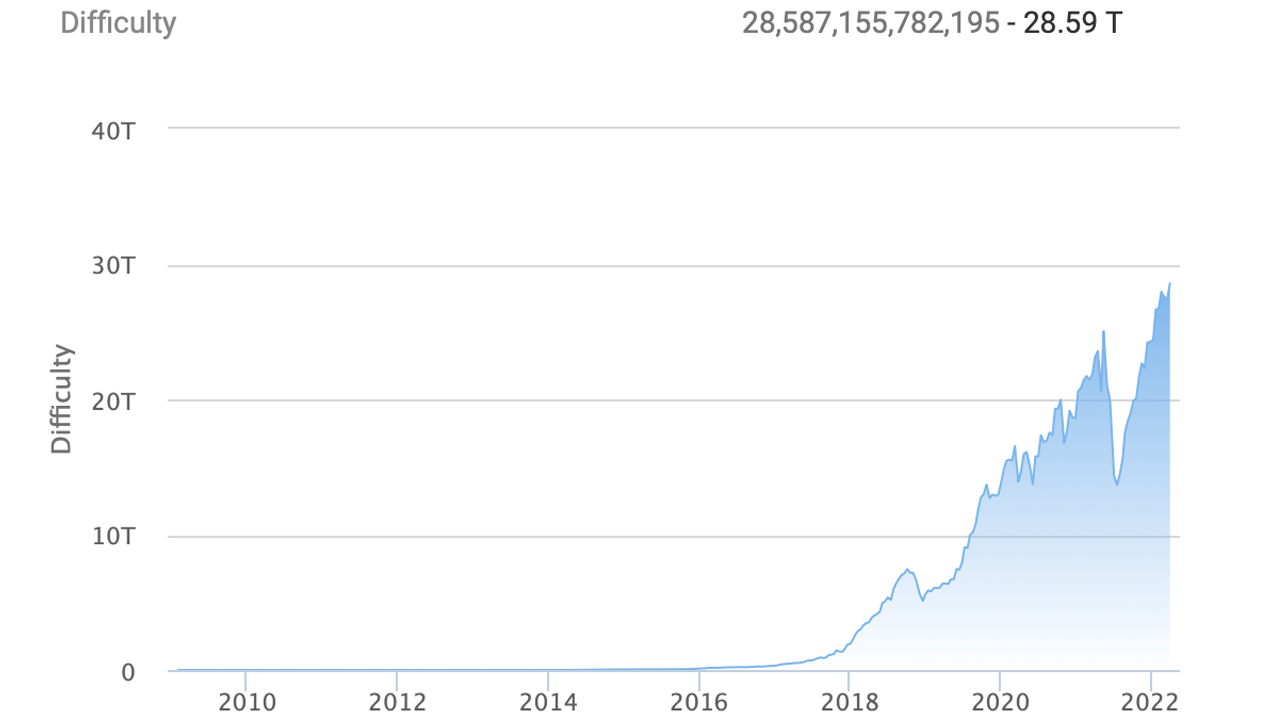Bitcoin’s mining difficulty increased this week on March 31, 2022, at block height 729,792 for the first time since February 17. The network’s difficulty jumped 4.31% higher bringing the metric to a lifetime high at 28.59 trillion. Since the increase, the network’s hashrate has been a bit more volatile dropping from 217 exahash per second (EH/s) on April 1, to today’s 175 EH/s.
Since Thursday, It Has Never Been More Difficult to Find a Bitcoin Block, Difficulty Adjusts 4.31% Higher
Bitcoin has hit yet another milestone this week, as the network’s mining difficulty is the highest it has ever been, and that means it is currently the hardest point in history to find a bitcoin (BTC) block. Satoshi Nakamoto created the mining difficulty to ensure that block times were around ten minutes apart and the difficulty adjustment algorithm (DAA) readjusts every two weeks.

The term “mining difficulty” refers to how difficult it is for mining participants to find a block subsidy, otherwise known as a block reward. Bitcoin’s mining difficulty is very important and keeps the network as consistent as possible. When new mining participants join the network and the hashrate increases, the DAA readjusts higher and it becomes more difficult for miners to find a block reward.
If the opposite happens, and hashrate subsides, then the DAA will decrease lower making it easier for the aggregate of mining participants. The 4.31% increase on Thursday, was the first increase in over four weeks or 2 DAA changes. The DAA readjusts every 2016 blocks and at the time of writing, 1,682 blocks remain until the retarget which is expected on April 13.
Currently, the next DAA change is expected on April 13 and is estimated to be a decrease. Since the increase on March 31, six-month charts show the hashrate has been fluctuating and is currently around 175.49 EH/s. Statistics on Saturday, April 2, show the hashrate’s 90-day average is roughly 195 EH/s.
Three-day statistics show that F2pool has gained the lead as the top miner with 18.91% of the global hashrate or 37.19 EH/s. Foundry USA is the second-largest pool, according to three-day metrics, with 18.66% of the global hashrate or 36.70 EH/s. In three days F2pool found 76 blocks, and during the same time frame, Foundry USA discovered 75 blocks.
The difficulty’s lifetime high of 28.59 trillion makes it harder than ever before for all the mining pools to find a block reward. Currently, there are 11 known mining pools with computational power dedicated to the network, and 1.99% of the global hashpower or 3.91 EH/s is owned by unknown mining entities.
The mining difficulty’s lifetime high also occurred a day before miners found the 19 millionth bitcoin at block height 730,034. Since then, miners have discovered 19,000,592.18 BTC (at the time of writing) so far and the issuance remaining is 1,999,193.73 BTC.
What do you think about the network’s difficulty increasing 4.31% higher this week? Let us know what you think about this subject in the comments section below.
Image Credits: Shutterstock, Pixabay, Wiki Commons
Disclaimer: This article is for informational purposes only. It is not a direct offer or solicitation of an offer to buy or sell, or a recommendation or endorsement of any products, services, or companies. Cryptox.trade does not provide investment, tax, legal, or accounting advice. Neither the company nor the author is responsible, directly or indirectly, for any damage or loss caused or alleged to be caused by or in connection with the use of or reliance on any content, goods or services mentioned in this article.




